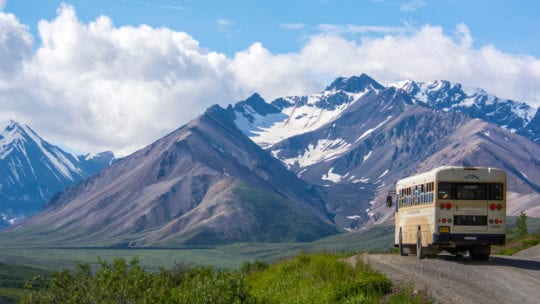
In some parts of the country, school buses started rolling this week and pumpkin spice appeared on coffee shop menus, but summer still officially exists on the calendar for another month. Vacation season continues in full force through Labor Day, and this means the inevitable travel crisis headlines.
Three hundred tourists encountered a stressful situation at Denali National Park in Alaska this past weekend. Weeks of heavy rains caused mudslides, temporarily stranding visitors along the park’s lone road. Denali instantly dispatched road crews to clear the debris. According to a release from the park, crews cleared the lane within three hours, allowing the 17 busses gathered at Toklat Rest Area to move on toward the park entrance. The park superintendent also immediately closed the road to prevent concurrent incidents.
Whether it be flight delays, shark sightings, wildfires or mudslides, tourism PR pros should hope for the best, but always prepare for the worst, especially in the summer during peak vacation time. Denali showed preparedness and a quick resolution of the scary situation, which organizations would be right to mirror. These takeaways from the situation can help guide your brand through any crisis.
More information is always better
A brand cannot hide in a crisis, so providing information not only to the consumers involved—but also the media—is always better. Denali issued not one, but four press releases, providing details surrounding the evacuation process as well as updates on the road closing for current park visitors, family and employees. Releases encouraged visitors to visit the current conditions page, updated with the latest information on the safest places for tourists to visit. The National Park also posted extensive updates on Facebook and Twitter. Taking this route allows Denali to control the messaging and provide first hand accounts for all media to relay.
Establish partnerships
No man, or brand in this case, is an island, so establishing partnerships, even without crisis in mind, allows for more help when a situation arises, and for the wider spread of information overall. Denali partnered with bus service contractors, Joint Venture, whose drivers began reporting the debris on the side of the road, and worked hard to deliver the visitors back to safety. Park superintendent, Don Striker, praised their partner in a Denali press release.
“We'd like to thank our Joint Venture partners for all their assistance in dealing with this closure,” said Striker. “Though brief, these events can have a large impact on people, and Joint Venture did an excellent job of working with us to shuttle visitors to different areas of the park, adapting their tours and allowing people to still experience the open portion of the road, and making sure people who were out in the backcountry could be shuttled back to the entrance.”
In the Northeast, sharks have also discovered Cape Cod and its neighboring islands to be their top vacation spot in recent years. Numerous shark sightings have caused headaches for beachgoers on their normally pleasant and relaxing vacations. Thankfully shark tracking organizations can alert those in the Cape area of highly-trafficked shark waters. The Atlantic White Shark Conservancy provides up-to-the-minute information on its Sharktivity app, following patterns and trails on a daily basis.
Consumers come first
And while communicating to the media is important, consumers should remain the number one priority. This can be a challenge in places where cellular service or WiFi may not be readily available, and it may be difficult to communicate relevant information to those who may harbor a disability, like blindness or hearing loss. In those situations it can help to create image-based content with captions for those who cannot hear. For those who cannot see, clear and concise spoken instruction is most important. If the capabilities are available, providing information in braille or with sign language can really help to accommodate those who may be struggling.
If we wanted to get creative with the Denali issue, and service or radio were not available, it may have been worthwhile to deliver instructions via drone, to the stranded bus drivers and passengers.
Also important? The follow up. You never want to leave consumers with memories of a bad experience. Many will remember how well they were treated after a traumatic event. Take care of them at that moment, as well as in the days, weeks and months following. Make them realize they are important to you, and that you haven’t forgotten about them.
